 Sunday/Weekend
Sunday/Weekend

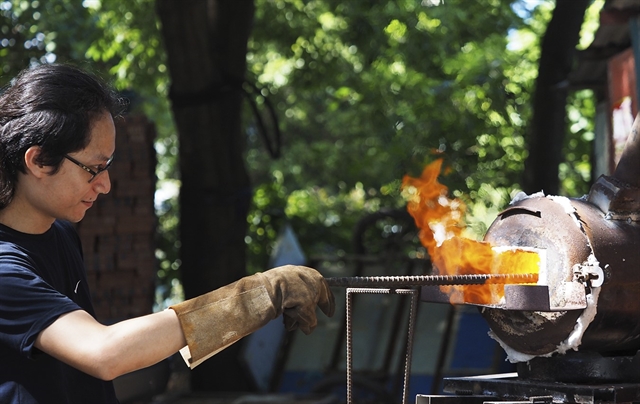 |
| ON FIRE: Hoàng Mạnh Chiến is among the few individuals in Việt Nam who possess the skill to forge legendary Damascus steel. — Photo suckhoedoisong.vn |
By Thanh Nga
From a distance, Hoàng Mạnh Chiến appears the master artisan. Despite his sweaty body, he remains passionately dedicated to crafting extraordinary, beautiful knives.
Chiến, a young blacksmith, is among the few individuals in Việt Nam who possess the skill to forge kind of legendary Damascus steel. This type of metal is renowned for producing exquisite swords and knives.
With his beautifully patterned knives, Chiến is in the vanguard of forging Damascus steel in Đa Sỹ blacksmith village, located in Kiến Hưng Ward, Hà Đông District, on the outskirts of Hà Nội.
"I have only been pursuing this profession for about two years, but it feels as though it's ingrained in my blood. Perhaps it's because I grew up surrounded by hammers in my relatives' workshops in the village, which has been celebrated for centuries for its high-quality farm tools and cutlery," Chiến told Việt Nam News.
"I have had a passion for blacksmithing since I was young. As I grew up, I attended a vocational college and worked for a business in Vĩnh Phúc Province. However, my love for blacksmithing persisted. During the COVID quarantine two years ago, I returned to my Đa Sỹ native village, and decided to abandon everything for blacksmithing. I spent six months re-learning and honing my skills at my uncle's smithy. It was during this time that I gradually began forging Damascus steel."
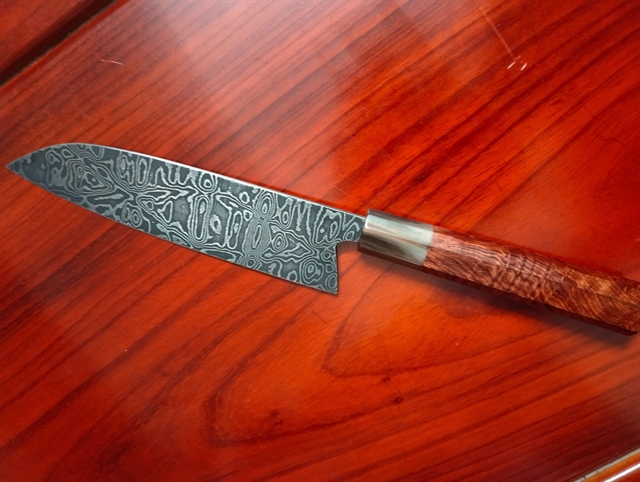 |
| PRETTY PATTERNS: A Damascus steel knife crafted by Hoàng Mạnh Chiến. — Photo courtesy of Chiến |
Through his research, Chiến discovered that Damascus steel, originating from the Middle East, possesses exceptional properties. The technique for forging this type of steel has been lost since the 17th century.
"When I started, I had doubts about the authenticity of the videos showcasing this type of knife. I didn't dare try it myself. However, I delved into extensive research, studying types of steel and the process of crafting knives with distinct vein patterns. The most challenging aspect was sourcing the steel required, as it is scarce in the Vietnamese market," he said.
"As a newcomer to the craft, acquiring small quantities for practice proved difficult. Consequently, I resorted to using scrap steel and experimented with combining different pieces. Fortunately, my initial attempt at forging steel to test its viability for making Damascus knives was a success."
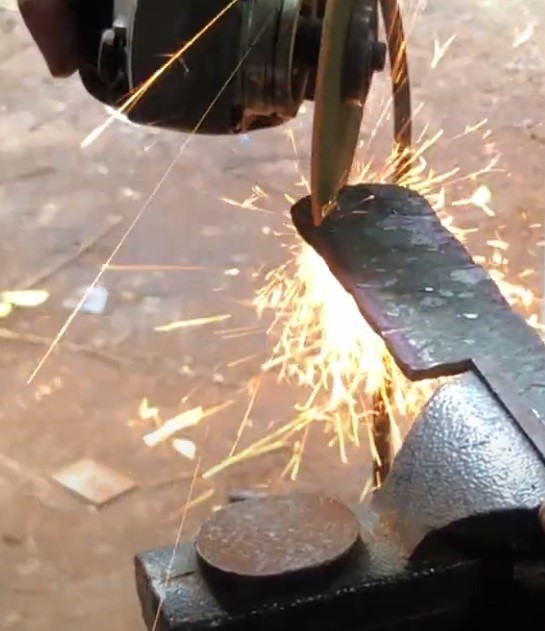 |
| SLOW PROCESS: It takes approximately two to three days to make a Damascus knife. — Photo courtesy of Chiến |
Despite this initial success, he encountered numerous setbacks and made many mistakes. At times, he felt disheartened. However, after seeking guidance from experienced blacksmiths in the village, Chiến learned that improper fire temperatures resulted in undesirable products.
"Once I became proficient in controlling the fire using charcoal and forging manually, I began contemplating establishing a small workshop of my own," he said.
The process of crafting a Damascus steel knife involves several distinct stages. It takes approximately two to three days to make a knife, selling for VNĐ1 million to 2 million.
Unlike forging knives from a single ingot of steel, Damascus steel is entirely handmade, and the steel forging process alone takes an entire day.
The defining characteristic of Damascus steel is its multitude of layers. Starting with a billet comprising more than 30 layers, the steel is tempered, stretched, cut into sections, and then stacked three to four times. The Damascus steel knives created by Chiến boast more than 100 layers.
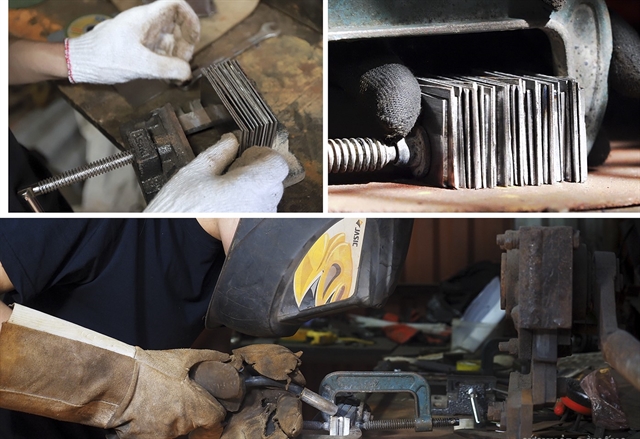 |
| LAYERED UP: Damascus steel knives made by Chiến boast more than 100 layers. — Photo suckhoedoisong.vn |
Chiến's knives exhibit naturally flowing, circular, layered lines on their surfaces.
Vietnamese knives are known for their exceptional sharpness. However, they are often made from scrap steel, such as car springs, which makes them prone to oxidation, rust, and unattractive designs.
Chiến's products are increasingly meeting the demands of consumers who desire a set of knives that are not only convenient and sharp, but also aesthetically pleasing in the kitchen.
Chiến is among the few young individuals in the Đa Sỹ blacksmith village to continue the ancient craft.
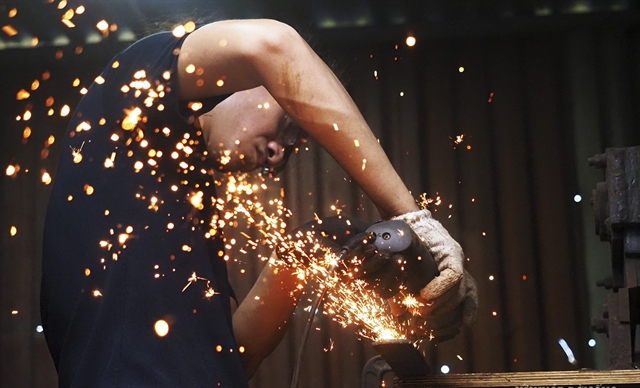 |
| INITIAL SPARKS: Hoàng Mạnh Chiến started making Damascus steel knives nearly two years ago. — Photo suckhoedoisong.vn |
"Currently, there are still over 1,000 households engaged in blacksmithing in our village, but the numbers are dwindling. The skilled artisans are getting older, and the younger generation is losing interest in the trade. I aspire to contribute to the preservation of our craft by exploring new directions," Chiến said.
"As society progresses, traditional crafts are in danger of being lost. Nevertheless, I firmly believe that handmade products will continue to be appreciated. I intend to dedicate myself to this profession for the rest of my life. I am continuously honing my knife-making skills, hoping that more people will soon become acquainted with my products." VNS




